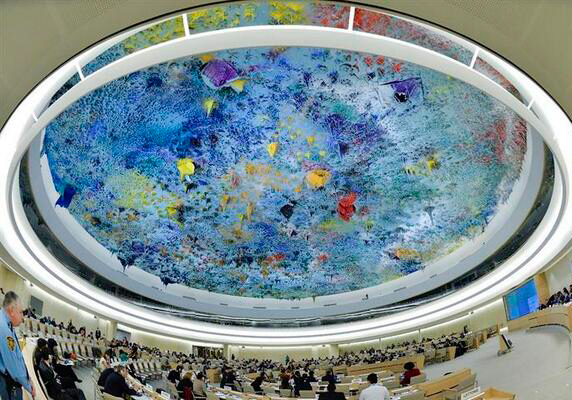
Mar 15, 2018 | Advocacy, Non-legal submissions
The ICJ today spoke at the United Nations on impunity and the situation for human rights in Peru.
The oral statement was made during the discussion at the Human Rights Council of the Universal Periodic Review outcome for Peru. It read as follows (translation from the original Spanish):
“Mr President,
The International Commission of Jurists (ICJ) recognizes the progress made by the Peruvian State in the field of human rights and its openness in relation to the recommendations made in the current cycle of the Universal Periodic Review.
The ICJ regrets, however, that the investigation and punishment of those responsible for the serious human rights violations that occurred during the internal armed conflict have not received the attention they deserve. On the contrary, the fight against impunity has receded with the granting of pardon and presidential grace to former president Alberto Fujimori who was serving a prison sentence for a series of crimes against humanity committed during his term. The presidential grace grants immunity from investigations and prosecutions in course or to be opened in the future.
One of the recommendations (111.97) that Peru accepts with qualifications refers to investigations and reparations to the thousands of women who suffered forced sterilization during the Fujimori administration. The measures of pardon and grace granted would exonerate Fujimori from investigation and punishment for this and other serious crimes. The ICJ urges the Peruvian State to implement the recommendations of the international community with full respect for international standards that prohibit impunity for serious violations of human rights.
Thank you Mr President.”
The ICJ oral statement complements a related written statement by the ICJ at the session.
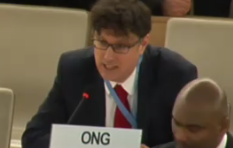
Mar 14, 2018 | Advocacy, Non-legal submissions
At the UN the ICJ today called on Thailand to stop misusing laws to restrict fundamental freedoms.
The statement was delivered during the general debate on situations requiring the attention of the Human Rights Council (item 4) and read as follows:
“Mr President,
The ICJ remains concerned at continued misuse of the law to restrict fundamental freedoms in Thailand.
By invoking military orders, criminal defamation laws and sedition-like offences, the Computer-Related Crime Act, and the Public Assembly Act, the legal system has been misused to harass human rights defenders, academics, lawyers, journalists, victims of human rights violations and their family members.
For example, this year alone, acting on complaints filed by the military, the police charged more than 50 people with violating a ban on political gatherings of five or more persons, put in place after the military coup of May 2014. Merely for exercising their human rights, people face a potential sentence of imprisonment. In one case, last year, police charged five academics and students after a banner reading “This is an academic forum not a military camp” was displayed at a University.
In February, security forces filed a complaint of defamation against an alleged victim of torture, Isma-ae Tae, simply because he was shown on television describing being tortured and ill-treated in military camps.
The ICJ urges Thailand to revoke or amend all laws, orders and announcements that are contrary to the rule of law and human rights protections, and to prevent the legal system from being misused to harass individuals who merely exercise their human rights.
Thank you Mr President.”
Video of the statement of the ICJ is available here:
Thailand-Misuse of laws restricts fundamental freedoms-Statement-HRC-2018-THA (Full statement in Thai, PDF)
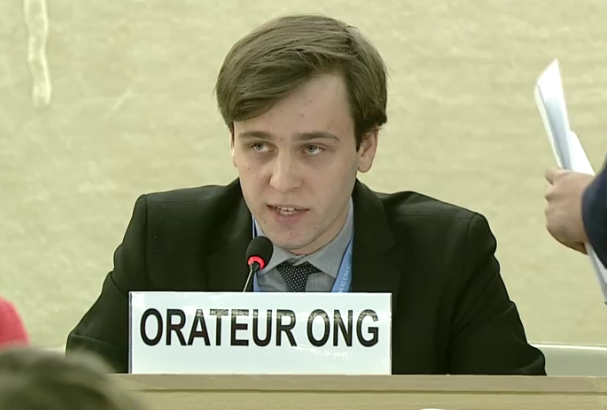
Mar 12, 2018 | Advocacy, Non-legal submissions
The ICJ today delivered a statement at the UN Human Rights Council calling on Myanmar to cooperate with UN mechanisms and for all UN agencies in the country to make human rights central to their approach.
The statement, made in the interactive dialogue with the international Fact Finding Mission on Myanmar, and the Special Rapporteur, read as follows:
“The International Commission of Jurists (ICJ) welcomes the update of the Independent International Fact Finding Mission. In relation to crimes under international law, the ICJ encourages the experts to continue to develop further specific recommendations for securing criminal accountability and providing redress.
The ICJ also welcomes the report of the Special Rapporteur, and strongly supports the renewal of her mandate and tenure.
As a UN Member State, the Government of Myanmar should fully cooperate with all the organs and mechanisms of the UN, in accordance with its obligations under the UN Charter.
At this session, the government asked for ‘concrete evidence’ of alleged human rights violations, and committed to taking action against perpetrators, but permission to enter the country is still refused to the Fact Finding Mission, to the Special Rapporteur and to the Office of the High Commissioner for Human Rights.
To demonstrate a genuine commitment to truth and accountability, the Government must allow them full access to areas of concern, particularly to Rakhine State and to conflict areas in Kachin State and Shan State.
Humanitarian actors and independent media must also be immediately allowed full and unimpeded access, particularly to Rakhine State, as recommended by the government’s own Advisory Commission.
The current situation in Rakhine State is incongruous to voluntary returns of Rohingya refugees. At the same time, the UN High Commissioner for Human Rights must be included in repatriation planning with a full mandate to protect refugees. This is contemplated in current repatriation arrangements with the Government of Bangladesh, and the Government of Myanmar must now formalize this relationship with UNHCR.
Experts, what can be done to ensure all UN agencies present in Myanmar actually put ‘human rights up front’ in the line with the mandate of every UN organ under the UN Charter?”
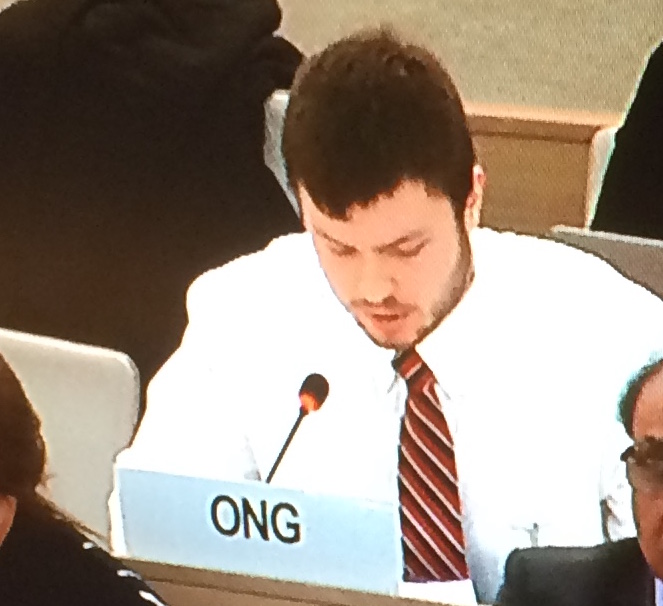
Mar 9, 2018 | Advocacy, Non-legal submissions
The ICJ today delivered an oral statement to the UN Human Rights Council, highlighting the need for substantive discussions towards a treaty on business and human rights to be transparent, broad-based with clear timelines.
The statement, which was made during the General Debate on item 3 with the Human Rights Council, read as follows:
Mr President,
Regarding the “Report on the third session of the open-ended intergovernmental working group on transnational corporations and other business enterprises with respect to human rights” (A/HRC/37/67), the ICJ notes with satisfaction the holding of the third session and congratulates the participants, especially the wide participation of civil society groups. The ICJ calls on States from all regions to engage meaningfully in the important work of the OEWG.
The discussions during the third session confirm the need for an international treaty in the area of business and human rights to fill the existing normative and legal protection gaps. Recent years have seen little improvement in this area despite the growing State and business discourse about policies and commitments. Harassment and attacks on human rights defenders that work in the area of corporate accountability have increased and the difficulties for victims of abuse to have access to an effective judicial remedy persist, especially at the transnational level.
The ICJ calls for a transparent and broad-based consultation process with clear timelines to move in the direction of a draft treaty on the basis of the document “Elements for a treaty” presented by the Chairperson –Rapporteur. The ICJ calls on all States and stakeholders to engage responsibly in this process to enable the fourth session of the Working Group to focus on substantive negotiations overcoming divisions on procedure and politics.
Thank you.
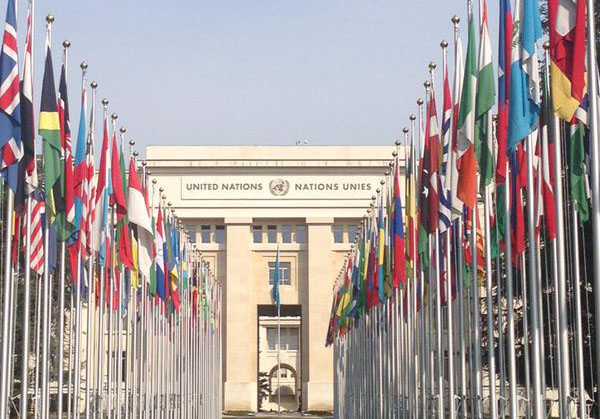
Mar 9, 2018 | Advocacy, Open letters
The ICJ and other organisations today express concern about China’s draft UN resolution, “Promoting the International Human Rights Cause through Win-Win Cooperation”.
In a letter addressed to the Member and Observer States of the UN Human Rights Council, the organizations wrote:
“The draft resolution entitled “Promoting the International Human Rights Cause through Win-Win Cooperation” lacks balance and undermines accepted international human rights law and principles. Its adoption could undermine the ability of the Council and its mechanisms to protect and promote human rights, and risks undermining the rights of victims of human rights violations.
No resolution that purports to promote human rights but ignores victims can be considered a “win” for anyone. The right of every victim to an effective remedy, regardless of the preferences of the responsible State, lies at the very heart of any meaningful understanding of human rights, as the General Assembly, the Council, as well as the Universal Declaration of Human Rights (UDHR) and human rights treaties, have repeatedly affirmed.
Cooperation between States, and between States and the Human Rights Council and its mechanisms, is an important component of the international human rights system. The version of cooperation envisioned by the draft resolution, however, finds no basis in the decades of practice of human rights at the UN or in the Institutional Building Package for the Council. “Win-win cooperation” and “a community of shared future for mankind” instead emanate specifically from the speech made by Chinese President Xi at the Palais des Nations in January 2017 and other national policy statements. Their implications have not been explained by the Chinese delegation, and reading these terms in their original context only raises greater concern about their import.
The language stating that “win-win cooperation is the only viable option” is perhaps the best example of our many concerns. Although the draft resolution does not specify in relation to what it is “the only viable option”, presumably the implication is with regard to human rights. This language of the draft resolution directly contradicts and undermines that part of the Council’s mandate, as articulated by the General Assembly in its resolution 60/251, that requires it to respond promptly and effectively to gross and systematic human rights violations.
Indeed, in all too many actual situations of gross and systematic violations faced by the Council, States responsible for human rights violations have shown no good faith to engage in any form of cooperation that could actually assist to end the violations or fulfil the rights of the victims. The draft resolution defies experience, and suggests no consequences for persistent non-cooperation.
Additionally, there is no mention in the draft concerning enforcement of States’ obligations under international human rights law by national, regional or international courts or other bodies, or even at a more general level, the need for accountability where abuses occur. As such, only impunity stands to “win” from such an approach.
Furthermore, the concept of “win-win cooperation” in the draft resolution as currently drafted clearly focuses predominantly, if not exclusively, on cooperation between States. The draft resolution does not call for States to cooperate with the Human Rights Council and its mechanisms. Neither does it call on States to refrain from committing reprisals against individuals or groups seeking to cooperate with UN human rights mechanisms to promote and protect human rights, including civil society actors and victims of human rights violations.
Our organisations call on States to reject the proposed resolution on “Promoting the International Human Rights Cause through Win-Win Cooperation” as drafted. Indeed, the problems with the text are so fundamental and far-reaching, it is difficult to see how consensus could possibly be reached without a substantial rethinking of the approach. If the proponents of the draft resolution sincerely believe that “win-win cooperation is the only viable option”, they surely cannot, at the same time, believe that it would be consistent with the draft resolution’s own terms for its adoption to be forced through on a divided vote, and should withdraw the draft resolution from consideration at the present Council session.
Signatories:
- Asian Legal Resource Center
- Amnesty International
- Cairo Institute for Human Rights Studies
- Conectas
- Defend Defenders
- FIDH
- Human Rights Watch
- International Commission of Jurists
- International Service for Human Rights
The letter can be downloaded in PDF format here: UN-HRC37-OpenLetter-ChinaResolution-2018
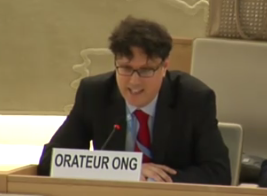
Mar 5, 2018 | Advocacy, Non-legal submissions
The ICJ today delivered an oral statement to the UN Human Rights Council, on transitional justice, prevention and impunity, highlighting the continuing problem of impunity in Nepal.
The statement, which was made during a clustered interactive dialogue with the Special Rapporteur on the promotion of truth, justice, reparation and guarantees of non-recurrence and the Special Adviser of the Secretary-General on the Prevention of Genocide, read as follows:
“The International Commission of Jurists (ICJ) remains deeply concerned by continuing impunity for gross human rights violations in many parts of the world, which undermines the potential for transitional justice to contribute to prevention as outlined in the Joint Study (A/HRC/37/65).
For example, in Nepal, more than ten years after the civil war, political expediency has trumped calls for justice and accountability. There has been near absolute impunity for those responsible for serious crimes under international law.
Transitional justice mechanisms – the Truth and Reconciliation Commission (TRC) and Commission on Investigation of Disappeared Persons (CoID) – have fallen short of international standards, both in their constitution and their operation, despite repeated orders by the Supreme Court of Nepal to enforce the standards.
The Commissions’ deeply flawed mandates, among other problems, allow them to recommend amnesties for gross human rights violations. In addition, their non-consultative, uncoordinated and opaque approach to their work has also created distrust with all major stakeholders, including conflict victims and members of civil society.
The Government continues to flout its obligation, both pursuant to the Supreme Court’s orders and under international law, to enact domestic legislation to criminalize serious crimes in accordance with international standards.
As highlighted by in the Joint study, turning a blind eye on past atrocities signals that some perpetrators are above the law, which further discredits State institutions and “breeds a (long-standing) culture of impunity in which atrocities may become ‘normalized’, rendering prevention significantly more difficult.” (para 43)
That, indeed, is the experience in Nepal: continuing impunity for gross human rights violations perpetrated during the conflict is one of the major obstacles to the creation of a stable and legitimate democratic government and lies at the heart of the rule of law crisis in the country. Ending impunity is essential to preventing further violations.”
Video of the statement is available here:
The delegation of Nepal exercised its right to reply later in the day. Its reply is here:
The ICJ oral statement complements a related written statement by the ICJ at the session.










